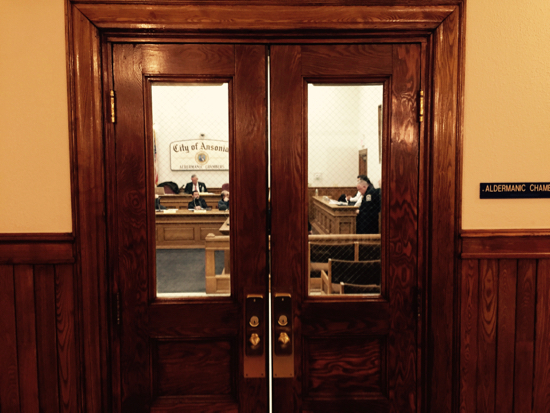 The City of Ansonia’s lawyer issued a reminder to public officials about when they can — and cannot — exclude members of the public from meetings.
The City of Ansonia’s lawyer issued a reminder to public officials about when they can — and cannot — exclude members of the public from meetings.
The two-page memo spelling out the Freedom of Information Act’s rules on “executive sessions” was sent last month to all of the city’s boards and commissions and the recording secretaries who prepare agendas and minutes.
The document is posted below.
John Marini, the city’s corporation counsel, said he wrote the memo as a periodic reminder to public officials.
 Marini has also held Freedom of Information workshops with city officials since Mayor David Cassetti appointed him to the post in late 2013.
Marini has also held Freedom of Information workshops with city officials since Mayor David Cassetti appointed him to the post in late 2013.
The public’s business should obviously be conducted in public in the vast majority of cases.
But the FOI Act lets public agencies go behind closed doors if a discussion meets one of five limited reasons:
- individual officers or employees (unless the person to be discussed asks the discussion to be public)
- strategy concerning pending claims or litigation
- security matters
- real estate deals
- discussion of public records otherwise exempt from the FOI Act (e.g. certain police records)
It’s important for officials to limit executive sessions to only those topics. If not, they’re not only shutting out taxpayers, but breaking the law.
“You’re taking a conversation away from the public,” Marini said. “You may do so only under specific reasons. If it’s not in that list of exceptions, it is not legal.”
The exceptions are tailored narrowly to specify only situations where making discussions open could adversely affect the public. For example, if the city were being sued and officials talked about specifics of a possible settlement in public, it would give an unfair advantage to the person who filed the lawsuit.
“If the information being discussed fell into the wrong hands, it could be used against the city, against the taxpayers,” Marini said.
The memo also touches on two other executive session no-nos: voting while meeting out of public view, and putting something like “Executive session if needed” on agendas. Both are prohibited by the Freedom of Information Act, though are seen quite often in the lower Valley.
At the same time, the city has to provide basic information about what they’re discussing behind closed doors, the lawyer noted.
“The public may not be able to have access to those conversations, but they should know generally what’s going on,” Marini said. “They need to know that a matter is being discussed at the meeting and they should have idea of what that matter is and they should know why it’s privileged.”
Ansonia Executive Session Memo by The Valley Indy on Scribd